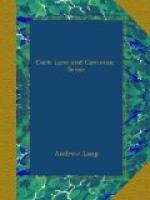Dr. Hibbert never even asks for the authority on which this legend reposes, certainly Balcarres does not tell the tale in his own report, or memoirs, for James II. (Bannatyne Club, 1841). The doctor then grumbles that he does not know ’a syllable of the state of Lord Balcarres’s health at the time’. The friend of Bayle and of Marlborough, an honourable politician, a man at once loyal and plain-spoken in dealings with his master, Lord Balcarres’s word would go for much, if he gave it. {190} But Dr. Hibbert asks for no authority, cites none. He only argues that, ’agreeably to the well-known doctrine of chances,’ Balcarres might as well have this hallucination at the time of Dundee’s death as at any other (p. 232). Now, that is a question which we cannot settle, without knowing whether Lord Balcarres was subject to hallucinations. If he was, cadit quaestio, if he was not, then the case is different. It is, manifestly, a problem in statistics, and only by statistics of wide scope, can it be solved. {191} But Dr. Hibbert was content to produce his easy solution, without working out the problem.
His second case is of 1662, and was taken down, he says, by the Bishop of Gloucester, from the lips of the father of Miss Lee. This young lady, in bed, saw a light, then a hallucination which called itself her mother. The figure prophesied the daughter’s death at noon next day and at noon next day the daughter died. A physician, when she announced her vision, attended her, bled her, and could find nothing wrong in her health. Dr. Hibbert conjectures that her medical attendant did not know his business. ’The coincidence was a fortunate one,’ that is all his criticism. Where there is no coincidence, the stories, he says, are forgotten. For that very reason, he should have collected contemporary stories, capable of being investigated, but that did not occur to Dr. Hibbert. His last case is the apparition of Mrs. Donne, with a dead child, to Dr. Donne, in Paris, as recorded by Walton. As Donne was a poet, very fond of his wife, and very anxious about her health, this case is not evidential, and may be dismissed for ‘a fortuitous coincidence’ (p. 332).
Certainly Dr. Hibbert could come to no conclusion, save his own, on the evidence he adduces. But it was by his own fault that he chose only evidence very remote, incapable of being cross-examined, and scanty, while we know that plenty of contemporary evidence was within his reach. Possibly the possessors of these experiences would not have put them at his disposal, but, if he could get no materials, he was in no position to form a theory. All this would have been recognised in any other matter, but in this obscure branch of psychology, beset, as it is, by superstition, science was content to be casual.




